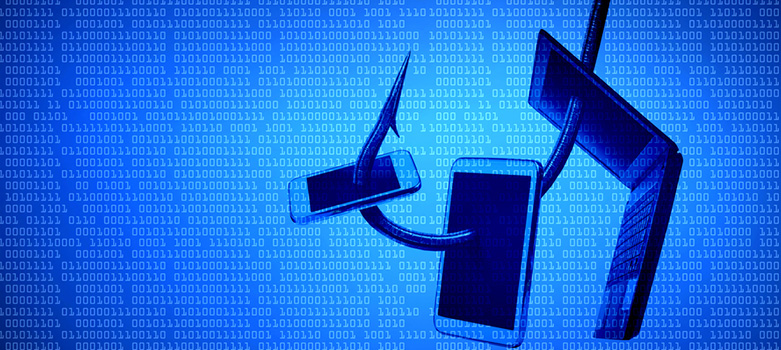UTSA study shows how phishing scams thrive on overconfidence

(Jan. 9, 2017) -- A new study by H.R. Rao, AT&T Distinguished Chair in Infrastructure Assurance and Security at The University of Texas at San Antonio (UTSA), examines overconfidence in detecting phishing e-mails. According to Rao, most people believe they're smarter than the criminals behind these schemes, which is why so many fall easily into a trap.
"A big advantage for phishers is self efficacy," Rao, a UTSA College of Business faculty member, said. "Many times, people think they know more than they actually do, and are smarter than someone trying to pull of a scam via an e-mail."
However, phishing has continued to evolve with the internet. It's no longer strangers posing as troubled Nigerian princes looking to cheat the average person out of their credit card information. Instead, phishing e-mails often look like messages from companies ordinary people recognize and trust.
"They're getting very good at mimicking the logos of popular companies," Rao said.
The researcher was actually nearly caught up in a phishing scam last year, when an e-mail that appeared to be from UPS informed him that there was a problem with a package he had sent. Even Rao, a highly experienced cybersecurity researcher, nearly fell for the scam, as he happened to have recently mailed a package via UPS.
"In any of these situations, overconfidence is always a killer," he said.
Rao's study, which he collaborated on with colleagues from The University of Texas at Arlington and Columbia College, utilized an experimental survey that had subjects choose between the genuine and the sinister e-mails that he and his colleagues had created for the project. Afterward, the subjects explained why they made their choices, which allowed Rao to classify which type of overconfidence was playing a role in their decision-making processes.
"Our study's focus on different types of over-confidence is unique, and allows us to understand why certain tactics appeal to different people," Rao said. "It helps us to figure out ways to teach people to guard against these kinds of methods."
According to Rao, people will continue to be victimized by phishing scams until the public becomes better educated and, subsequently, less overconfident. He suggested citizen workshops or even an online game that would inform people of the newer every day dangers of the internet.
"Thousands of e-mails are sent out every day with the aim of harming someone or gaining access to their financial information," Rao said. "Avoiding that kind of damage is entirely in our own hands."
UTSA is ranked among the top 400 universities in the world and among the top 100 in the nation, according to Times Higher Education.
-------------------------------
Read H.R. Rao's study "Overconfidence in Phishing E-mail Detection."
Learn more about the UTSA Department of Information Systems and Cyber Security.
Learn more about cybersecurity at UTSA.
Connect with UTSA online at Facebook, Twitter, YouTube, Instagram and LinkedIn.
Events
Move-in Day is an exciting time for incoming students. Students living in Chaparral Village move in from August 20-21. The UTSA Housing and Residence Life (HRL) team looks forward to welcoming you all and helping you settle into your room.
Chaparral VillageMove-in Day is an exciting time for incoming students. Students living in Laurel Village move in on August 22. The UTSA Housing and Residence Life (HRL) team looks forward to welcoming you all and helping you settle into your room.
Laurel VillageThe College of Sciences welcomes our newest Roadrunners to UTSA at VIVA Science! This interactive event connects students with faculty, staff, student leaders, and peers while highlighting the opportunities available across the College.
Outdoor Learning Environment 2 (OLE), Flawn Building, Main CampusWe're excited to welcome the new class of UTSA College of Liberal and Fine Arts (COLFA) students to campus! Move In To COLFA is strongly recommended for new students in COLFA because it gives you the chance to learn about the Student Success Center, learn how to do college successfully and meet new friends.
Galleria (MH 2.01), McKinney Humanities Building, Main CampusBuild connections with your Alvarez College of Business peers and learn more about the Career Compass program! This opportunity will provide fun interactions, giveaways and a chance to meet your next friend!
Richard Liu Auditorium (BB 2.01.02,) Business Building, Main CampusCelebrate the end of summer and the start off a great fall semester with The Housing Block Party! This event will have live music, carnival-style treats, artists, games, and activities galore. Come and join us for a night of fun!
Multipurpose Room/Lawn, Guadalupe Hall, Main CampusBe part of an unforgettable night as SOSA takes the field for its first public performance of the season! Experience the power, pride, and pageantry of UTSA’s marching band. Learn beloved traditions, practice cheers, and feel what it means to be a Roadrunner.
Campus Rec Fields

